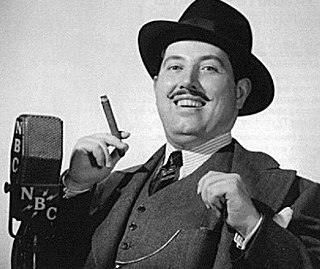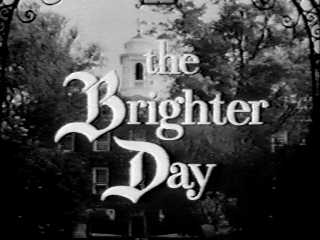Related Research Articles

The Edge of Night is an American mystery crime drama television series and soap opera, created by Irving Vendig and produced by Procter & Gamble Productions.

Guiding Light is an American radio and television soap opera. Guiding Light aired on CBS for 57 years between June 30, 1952, and September 18, 2009, overlapping a 19-year broadcast on radio between January 25, 1937, and June 29, 1956. With 72 years of radio and television runs, Guiding Light is the longest-running soap opera, ahead of General Hospital, and is the fifth-longest-running program in all of broadcast history; only the American country music radio program Grand Ole Opry, the BBC religious program The Daily Service (1928), the CBS religious program Music and the Spoken Word (1929), and the Norwegian children's radio program Lørdagsbarnetimen (1924–2010) have been on the air longer.

As the World Turns is an American television soap opera that aired on CBS for 54 years from April 2, 1956, to September 17, 2010. Irna Phillips created As the World Turns as a sister show to her other soap opera Guiding Light. With 13,763 hours of cumulative narrative, As the World Turns has the longest total running time of any television show. In terms of continuous run of production, As the World Turns at 54 years holds the fourth-longest run of any daytime network soap opera on American television, surpassed only by General Hospital, Guiding Light, and Days of Our Lives. As the World Turns was produced for its first 43 years in Manhattan and in Brooklyn from 2000 until 2010.

The Great Gildersleeve was a radio situation comedy broadcast in the United States from August 31, 1941 to 1958. Initially written by Leonard Lewis Levinson, it was one of broadcast history's earliest spin-off programs. The series was built around Throckmorton P. Gildersleeve, a regular character from the radio situation comedy Fibber McGee and Molly. The character was introduced in the October 3, 1939, episode of that series. Actor Harold Peary had played a similarly named character, Dr. Gildersleeve, on earlier episodes. The Great Gildersleeve enjoyed its greatest popularity in the 1940s. Peary played the character during its transition from the parent show into the spin-off and later in four feature films released at the height of the show's popularity.

Portia Faces Life is an American soap opera first broadcast as a radio series from 1940 to 1953, and then on television for a single season in the mid-1950s. It began in syndication on April 1, 1940, and was broadcast on some stations that carried NBC programs, although it does not seem to have been an official part of that network's programming. The original title was Portia Blake Faces Life.

The Brighter Day is an American daytime soap opera which aired on CBS from January 4, 1954, to September 28, 1962. Originally created for NBC Radio by Irna Phillips in 1948, the radio and television versions ran simultaneously from 1954–56. Set in New Hope, Wisconsin, the series revolved around Reverend Richard Dennis and his four children, Althea, Patsy, Babby and Grayling.

The Aldrich Family, a popular radio teenage situation comedy, was also presented in films, television and comic books. In the radio series' opening exchange, awkward teen Henry's mother called, "Hen-ry-y-y-y! Hen-ry Al-drich!", and he responded with a breaking adolescent voice, "Com-ing, Mother!"

One Man's Family is an American radio soap opera, heard for almost three decades, from 1932 to 1959. Created by Carlton E. Morse, it was the longest-running uninterrupted dramatic serial in the history of American radio. Television versions of the series aired in prime time from 1949 to 1952 and in daytime from 1954 to 1955.

The First Hundred Years was the first ongoing TV soap opera in the United States that began as a daytime serial, airing on CBS from December 4, 1950 until June 27, 1952.
The Guiding Light (TGL) was an American radio series which became a television soap opera.

Young Doctor Malone is an American soap opera, created by Irna Phillips, which had a long run on radio and television from 1939 to 1963. The producer was Betty Corday (1912–1987), who also produced Pepper Young's Family and later was a co-creator with husband Ted Corday of NBC Daytime's Days of Our Lives.

Nick Carter, Master Detective is a Mutual radio crime drama based on tales of the fictional private detective Nick Carter from Street & Smith's dime novels and pulp magazines. Nick Carter first came to radio as The Return of Nick Carter, a reference to the character's pulp origins, but the title was soon changed to Nick Carter, Master Detective. A veteran radio dramatist, Ferrin Fraser, wrote many of the scripts.

Big Sister was a daytime radio drama series created by Lillian Lauferty and broadcast on CBS from September 14, 1936, to December 26, 1952. It was sponsored by Lever Brothers for Rinso until 1946 when Procter & Gamble became the sponsor.

Leon Janney was an American actor and radio personality from 1920 to 1980.

Life Can Be Beautiful was a daytime radio drama broadcast on NBC and CBS during its 16-year run. The program was also facetiously known to many as Elsie Beebe, a contrived acronym based on the show's initials.
Kitty Foyle is an American old-time radio and television soap opera originally aired during the 1940s and 1950s that was based on the 1940 film of the same name starring Ginger Rogers. Kitty Foyle was created by soap opera mogul Irna Phillips of Guiding Light fame and produced by daytime radio monarchs Frank and Anne Hummert of Helen Trent recognition. The program originally starred Julie Stevens in the title role of Kitty Foyle on radio. On television, the title role was portrayed by Kathleen Murray.
The Raleigh Cigarette Program was an American old-time radio comedy program that starred comedian Red Skelton.
The Fred Allen Show was a long-running American radio comedy program starring comedian Fred Allen and his wife Portland Hoffa. Over the course of the program's 17-year run, it was sponsored by Linit Bath Soaps, Hellmann's, Ipana, Sal Hepatica, Texaco and Tenderleaf Tea. The program ended in 1949 under the sponsorship of the Ford Motor Company.
The Pepsodent Show is an American radio comedy program broadcast from 1938 to 1948, during the Golden Age of Radio. The program starred Bob Hope and Jerry Colonna, alongside Blanche Stewart, Elvia Allman, and a continuously rotating supporting cast of actors and musicians which included, for a time, Judy Garland, Frances Langford, and Desi Arnaz and his orchestra.

Lillian "Mitzi" Smith, known professionally as Mitzi Haynes, was an American actress and showgirl.
References
- ↑ In real life, Janney was 22 years old when the series started, and had already been married and divorced.
- 1 2 3 Dunning, John (1998). On the Air: The Encyclopedia of Old-Time Radio (Revised ed.). New York, NY: Oxford University Press. pp. 532–533. ISBN 978-0-19-507678-3 . Retrieved December 3, 2023.
- ↑ "Parker Family Begins Friday Night on KSCJ". Sioux City Journal. April 25, 1943. p. 23. Retrieved April 20, 2022– via Newspapers.com.
- 1 2 Cox, Jim (2008). Sold on Radio: Advertisers in the Golden Age of Broadcasting. McFarland. p. 92. ISBN 978-0-7864-5176-0 . Retrieved April 20, 2022.
- ↑ 1,200 See 1st Test of Big-Screen Television, New York Daily News , May 10, 1941, p. M10